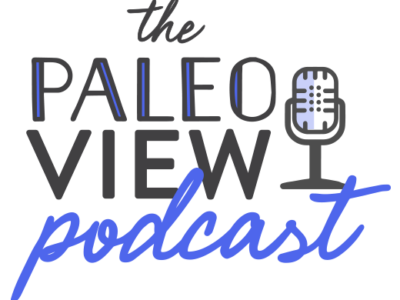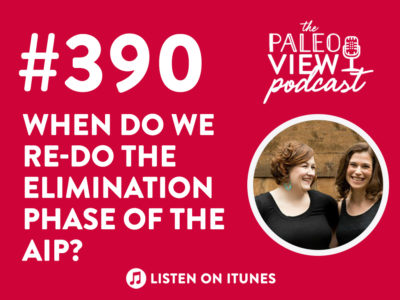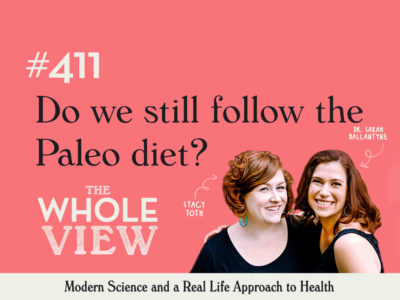In this episode, Stacy and Sarah discuss gut health, food allergies vs. intolerances, small intestinal bacterial overgrowth treatment, the various forms of elimination dieting to aid in gut recovery, and H. pylori.
On Sunday, May 12. The Paleo View launched their first ever bonus episode – The Mother’s Day show! Download the first bonus show by clicking here! And be on the lookout for our monthly, pay bonus podcast!
Listen in iTunes
or download and listen by clicking the PodBean player below
We’re now on Stitcher!
If you enjoy the show, please review it in iTunes!
The Paleo View (TPV), Episode 39: Gut Health
- 0:00 – Introduction
- 1:19 – News & Views
- Coming off the Beyond Bacon chaos, Stacy returned to Crossfit and is overall working towards recovery from the stress load
- Stacy had a great Mother’s Day, complete with Urban Poser’s Samoa Donuts – experienced a refreshing awareness where her sweet tooth was easily satisfied and she didn’t feel the need to go over board
- Sarah had a great couple of days and is very close to being done with part two of the book and then she will work on the cookbook section, which she is really excited to shift gears to
- The Paleo Approach is roughly 210,000 words right now, the book is an information dense book and people are getting a tremendous deal
- Sarah has made the science in the book incredibly approachable, just like it is on her blog, and it is truly a complete guide
- Part two of the book is all about the practical implementation – what lifestyle factors to focus on
- The book is a beast, with the nickname the encyclopedia – Sarah feels like she is racing for the finish line, but feels like she is going to make it and is looking forward to her three days off before editing work comes
- On Mother’s Day Sarah and her family hung out at home and played outside – it was a nice day
- The special bonus episode went live on Mother’s Day (May 12) and is available on iTunes, but you have to look for it under a song and not a podcast
- The Paleo View will be offered for free, but the The Paleo View Bonus Shows are offered at a minimal cost to recoup some of the costs that have gone into the show
- It is $0.99 per episode on the CD Baby site, but we don’t know what iTunes will charge.
- The show is an expanded ‘News and Views’ format of The Paleo View and is a personal, intimate discussion
- Despite what Sarah and Stacy anticipated, we are experiencing technical difficulties getting iTunes set-up for the bonus show, please use CD Baby until we resolve these issues
- Sarah hasn’t yet had a chance to listen to the Bonus Show because of book work
- Stacy was kind of taken back by the level of intimacy that the discussion took, and feels like mothers and daughters will in particular take a lot away on relationship development
- Stacy’s treadmill desk broke, so is now working from a standing desk
- Sarah spends a decent amount of time standing at her treadmill desk, especially when reading fine print or after eating a meal – is overall feeling so much better sitting less
- Stacy wants a standing desk for work, but is worried about being the weird one and how to handle the days where she doesn’t wear flats
- Stacy tells the world to go check out whatshouldwecallPaleolife.tumblr.com – it is great when you need a laugh!
- Reminder, please leave your reviews on both The Paleo View and Bonus Show on iTunes!
- Welcome new listeners! Happy belated Mother’s Day!
- Episode 38 is a science-y show about gut health, h pylori, small intestinal bacteria overgrowth, and gut repair
- 24:53 – Science with Sarah: Why do people react more violently to a food after eliminating it? When you stop reacting to food, is that an indicator that your gut has healed?
- In every gut there are cells that sample the environment inside the gut and present what they find to the immune system, essentially patrolling
- If you have a leaky gut, a lot more of what is in the gut leaks out and is presented to the immune system
- Food intolerances and food allergies are both different kinds of antibodies
- The cells that produce these antibodies are part of the immune system and are there to develop immunity towards certain things
- There are a number of cells in the immune system – protectors, therapists to calm, directors
- When you get to the end of an infection it is the director cells that divide and conquer and makes sure that the immune system doesn’t attack the wrong things and that it deactivates once the threat is gone
- With a food intolerance and food allergy, the middle management cells are directing antibodies
- In a normal person you achieve immune tolerance towards the food, which is an equal balance between the middle management cells and the suppressing cells – thus having no symptoms
- If you have a food allergy or intolerance the system is out of balance
- When you start any elimination diet you can experience exaggerated responses to small exposures for a number of reasons
- As your immune system regulates and your body heals, eventually you will end up at a point where both the cells that respond to food are at low levels
- You could eventually reach the point where exposures to food intolerances will not cause dramatic responses – it is a sign that your system has regulated
- How long it takes to get there is dependent on a number of factors, including genetics, stress level, sleep quality, nutrient density in diet, hormone regulation
- During the Cavekids PaleoFX panel, Chris Kresser mentioned that health isn’t having a violent reaction to bad food, that is the process to healing – health is when your body knows how to recover from the exposure to bad food (The Paleo View episode where gut health recovery was discussed with Diane Sanfilippo)
- Stacy notes that people on a Paleo diet will heal their gut in time, that there is another side to the intense negative reactions to an exposure where you body will better handle the minor exposures
- Thanks to Russ from The Domestic Man for chatting about this topic with Stacy, which sparked the suggestion for this podcast topic

- 36:57 – Q&A
- Brittany: Our current Functional Medicine Doctor thinks my family has SIBO (small intestinal bacterial overgrowth) and wants us on FODMAP free diet. With all our other food issues, I am concerned that we won’t get the nutrition needed, that my breastmilk will suffer along with my children’s sleep. What is the difference between FODMAPS, GAPS and SCD?
-
Stacy recommends that they look into a GAPS diet and a very structured approach to healing their gut
- It can be difficult to put kids on a limited diet, but Stacy has seen and heard amazing success stories from people who take a serious approach to healing their gut
- Sarah notes that GAPS and SCD are very similar
- GAPS is more of an inclusive system and includes some detoxification elements
- The general concept behind both GAPS and SCD is that you starve the bacteria in the gut
- GAPS places an emphasis on gut healing foods, and both highlight digestive enzyme supplements
- FODMAPS are fermentable sugars, and are sugars and fibers that are rich in fructose, but also includes sugar alcohols and long fiber chains rich in fructose – they are difficult for the body to digest and absorb, and ferment easy – making it easy for the bacteria to eat
- These are known as the gassy foods, and in someone with FODMAP sensitivity this is called fructose malabsorption, which means your body is having a hard time digesting and absorbing these sugars so there is more to feed the bacteria
- The autoimmune protocol combines some of those things, but focuses on the inclusion of foods that normalize gut bacteria
- Omega 3 fatty acids and fiber are the two foods known to have the most profound impact on the composition of your gut
- Even though there is a large amount of evidence, there are no scientific studies to back up the impact of a GAPS and SCD diet, the low FODMAP diet has a high amount of scientific research to back it up
- One of the issues that people face when they adopt a GAPS or SCD diet is that eventually the low crab intake starves the overgrowth, but also starves the good bacteria and you need to introduce prebiotics
- Which means eating more vegetables, starchy vegetables, fruit
- Stacy notes that if you are new to a Paleo diet, focus on cutting out the junk first, and as you get further into it find ways to maximize the nutrient density of the foods you eat and to ultimately improve your gut health
- Sometimes you have to eat the things you eat because your body needs it (bone broth, organ meat, sardines, etc.)
- No matter which of these paths you select, autoimmune, GAPS, SCD, etc. take the nutrient dense road and focus on the foods you can eat, not on the foods you can’t eat, and what lifestyle factors you can change to heal your body
-
- (55:45) Heather: Looking for help on how to manage a severe case of small intestine bacterial overgrowth (SIBO).
- Stacy notes that there is a time and a place for antibiotics, because sometimes food alone cannot solve problems
- In this case, Stacy suggests probiotic foods to help with the re-balancing of her gut
- Sarah suggests combining the antibiotics with a nutrient dense, gut friendly diet like what was outlined in question 1
- There have been case reports of SIBO where doctors have combined two or three different kinds of antibiotics, or even pair with anti-fungals, to manage the bacteria
- Here are other drugs that have shown effectiveness: rifaximin (brand name is Xifaxan), vancomycin, neomycin, tetracycline, metronidazole, levofloxacin and fluconazole
- Clinical trials where they have combined antibiotic therapy with probiotics and/or prebiotics have shown even better outcomes
- (Note, consult a doctor first) The common prebiotic typically used in these studies is VSL-3
- (Note, consult a doctor first) There are also some good studies on treating with prescript assist, which is soil based organisms, but specifically with irritable bowel syndrome
- (Note, consult a doctor first) There are also a variety of herbs that can be used as antimicrobials: monolaurin, cat’s claw, wormwood, goldenseal (caution: goldenseal stimulates immune system), pau d’arco, olive leaf extract, garlic, barberry, Oregon grape, oregano oil, extra virgin coconut oil, lactoferrin, DGL
- A b-vitamin complex is a good idea
- Digestive support supplements can also go a long way to help restore the gut
- Turn to primaldocs.com and Paleophysiciansnetwork.com
- (1:08:51) Dana: When an infection is not active, should I still be treating it, beyond what I already do for leaky gut?
- The standard treatment for h. pylori is the same as the base treatment for SIBO, including herbal supplements, under the supervision of a qualified professional
- H. pylori is a gram negative bacteria that lives in the upper gastro track and is in 50% of the world’s population, prominent in developing countries
- 80% of cases are asystematic
- When they are systematic people experience chronic inflammation of the stomach and small intestine, which causes a lot of misleading symptoms
- H. pylori causes ulcers, and increases your risk of stomach cancer
- If you get H. pylori early in life it can protect you from immune related conditions, if you get it later in life it can cause immune related conditions
- One of the best treatments is a nutrient rich diet – the AIP is a great place to start
- Talk to your doctor about whether or not you need to treat it and what your options and preferences are
- Don’t forget to check out the bonus show, leave reviews on iTunes, and we will be back next week!
- Brittany: Our current Functional Medicine Doctor thinks my family has SIBO (small intestinal bacterial overgrowth) and wants us on FODMAP free diet. With all our other food issues, I am concerned that we won’t get the nutrition needed, that my breastmilk will suffer along with my children’s sleep. What is the difference between FODMAPS, GAPS and SCD?
- 1:22:54 – Outro









